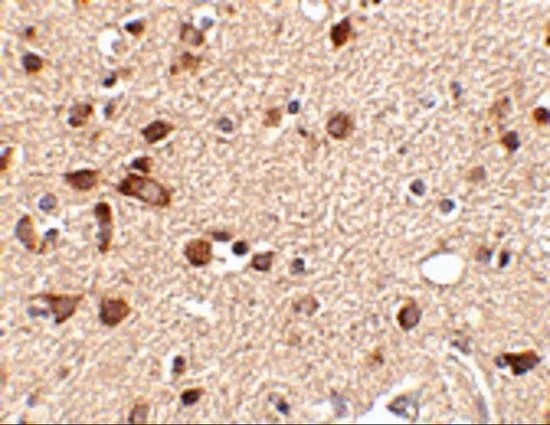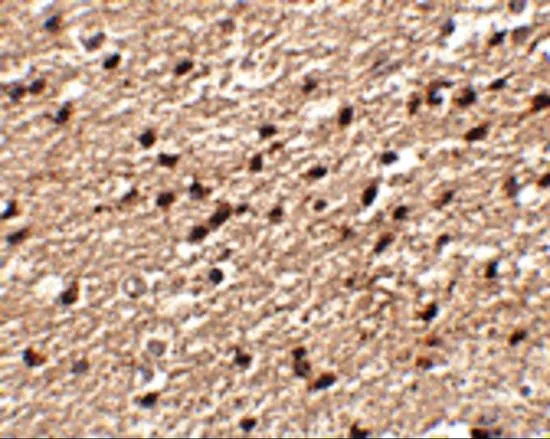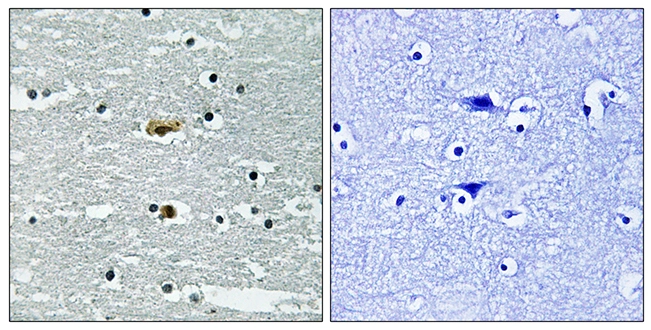![IHC-P analysis of breast adenocarcinoma tissue using GTX83543 STK39 antibody [2E10]. Antigen retrieval : Heat-induced epitope retrieval by 10mM citrate buffer, pH6.0, 100oC for 10min. Dilution : 1:50 IHC-P analysis of breast adenocarcinoma tissue using GTX83543 STK39 antibody [2E10]. Antigen retrieval : Heat-induced epitope retrieval by 10mM citrate buffer, pH6.0, 100oC for 10min. Dilution : 1:50](https://www.genetex.com/upload/website/prouct_img/normal/GTX83543/GTX83543_1535_IHC-P_w_23061420_693.webp)
IHC-P analysis of breast adenocarcinoma tissue using GTX83543 STK39 antibody [2E10]. Antigen retrieval : Heat-induced epitope retrieval by 10mM citrate buffer, pH6.0, 100oC for 10min. Dilution : 1:50
STK39 antibody [2E10]
GTX83543
ApplicationsWestern Blot, ImmunoHistoChemistry, ImmunoHistoChemistry Paraffin
Product group Antibodies
ReactivityDrosophila, Human
TargetSTK39
Overview
- SupplierGeneTex
- Product NameSTK39 antibody [2E10]
- Delivery Days Customer9
- Application Supplier NoteWB: 1:500-1:1000. *Optimal dilutions/concentrations should be determined by the researcher.Not tested in other applications.
- ApplicationsWestern Blot, ImmunoHistoChemistry, ImmunoHistoChemistry Paraffin
- CertificationResearch Use Only
- ClonalityMonoclonal
- Concentration1 mg/ml
- ConjugateUnconjugated
- Gene ID27347
- Target nameSTK39
- Target descriptionserine/threonine kinase 39
- Target synonymsDCHT, PASK, SPAK, STE20/SPS1-related proline-alanine-rich protein kinase, STE20/SPS1 homolog, Ste20-like protein kinase, proline-alanine-rich STE20-related kinase, serine threonine kinase 39 (STE20/SPS1 homolog, yeast), serine/threonine-protein kinase 39, small intestine SPAK-like kinase, ste-20-related kinase
- HostMouse
- IsotypeIgG1
- Protein IDQ9UEW8
- Protein NameSTE20/SPS1-related proline-alanine-rich protein kinase
- Scientific DescriptionMay act as a mediator of stress-activated signals.
- ReactivityDrosophila, Human
- Storage Instruction-20°C or -80°C,2°C to 8°C
- UNSPSC12352203
References
- Yarikipati P, Jonusaite S, Pleinis JM, et al. Unanticipated domain requirements for Drosophila Wnk kinase in vivo. PLoS Genet. 2023,19(10):e1010975. doi: 10.1371/journal.pgen.1010975Read this paper
- Humphreys JM, Teixeira LR, Akella R, et al. Hydrostatic Pressure Sensing by WNK kinases. Mol Biol Cell. 2023,34(11):ar109. doi: 10.1091/mbc.E23-03-0113Read this paper
- Pleinis JM, Norrell L, Akella R, et al. WNKs are potassium-sensitive kinases. Am J Physiol Cell Physiol. 2021,320(5):C703-C721. doi: 10.1152/ajpcell.00456.2020Read this paper
- Sun Q, Wu Y, Jonusaite S, et al. Intracellular Chloride and Scaffold Protein Mo25 Cooperatively Regulate Transepithelial Ion Transport through WNK Signaling in the Malpighian Tubule. J Am Soc Nephrol. 2018,29(5):1449-1461. doi: 10.1681/ASN.2017101091Read this paper

![IHC-P analysis of colon adenocarcinoma tissue using GTX83543 STK39 antibody [2E10]. Antigen retrieval : Heat-induced epitope retrieval by 10mM citrate buffer, pH6.0, 100oC for 10min. Dilution : 1:50 IHC-P analysis of colon adenocarcinoma tissue using GTX83543 STK39 antibody [2E10]. Antigen retrieval : Heat-induced epitope retrieval by 10mM citrate buffer, pH6.0, 100oC for 10min. Dilution : 1:50](https://www.genetex.com/upload/website/prouct_img/normal/GTX83543/GTX83543_1536_IHC-P_w_23061420_582.webp)
![IHC-P analysis of human ovary adenocarcinoma tissue using GTX83543 STK39 antibody [2E10]. Antigen retrieval : Heat-induced epitope retrieval by 10mM citrate buffer, pH6.0, 100oC for 10min. Dilution : 1:50 IHC-P analysis of human ovary adenocarcinoma tissue using GTX83543 STK39 antibody [2E10]. Antigen retrieval : Heat-induced epitope retrieval by 10mM citrate buffer, pH6.0, 100oC for 10min. Dilution : 1:50](https://www.genetex.com/upload/website/prouct_img/normal/GTX83543/GTX83543_1537_IHC-P_w_23061420_562.webp)
![IHC-P analysis of colon tissue using GTX83543 STK39 antibody [2E10]. Antigen retrieval : Heat-induced epitope retrieval by 10mM citrate buffer, pH6.0, 100oC for 10min. Dilution : 1:50 IHC-P analysis of colon tissue using GTX83543 STK39 antibody [2E10]. Antigen retrieval : Heat-induced epitope retrieval by 10mM citrate buffer, pH6.0, 100oC for 10min. Dilution : 1:50](https://www.genetex.com/upload/website/prouct_img/normal/GTX83543/GTX83543_1538_IHC-P_w_23061420_796.webp)
![IHC-P analysis of endometrium tissue using GTX83543 STK39 antibody [2E10]. Antigen retrieval : Heat-induced epitope retrieval by 10mM citrate buffer, pH6.0, 100oC for 10min. Dilution : 1:50 IHC-P analysis of endometrium tissue using GTX83543 STK39 antibody [2E10]. Antigen retrieval : Heat-induced epitope retrieval by 10mM citrate buffer, pH6.0, 100oC for 10min. Dilution : 1:50](https://www.genetex.com/upload/website/prouct_img/normal/GTX83543/GTX83543_1539_IHC-P_w_23061420_514.webp)
![IHC-P analysis of ovary tissue using GTX83543 STK39 antibody [2E10]. Antigen retrieval : Heat-induced epitope retrieval by 10mM citrate buffer, pH6.0, 100oC for 10min. Dilution : 1:50 IHC-P analysis of ovary tissue using GTX83543 STK39 antibody [2E10]. Antigen retrieval : Heat-induced epitope retrieval by 10mM citrate buffer, pH6.0, 100oC for 10min. Dilution : 1:50](https://www.genetex.com/upload/website/prouct_img/normal/GTX83543/GTX83543_1540_IHC-P_w_23061420_827.webp)
![IHC-P analysis of pancreas tissue using GTX83543 STK39 antibody [2E10]. Antigen retrieval : Heat-induced epitope retrieval by 10mM citrate buffer, pH6.0, 100oC for 10min. Dilution : 1:50 IHC-P analysis of pancreas tissue using GTX83543 STK39 antibody [2E10]. Antigen retrieval : Heat-induced epitope retrieval by 10mM citrate buffer, pH6.0, 100oC for 10min. Dilution : 1:50](https://www.genetex.com/upload/website/prouct_img/normal/GTX83543/GTX83543_1541_IHC-P_w_23061420_972.webp)
![WB analysis of HEK293T cells transfected with STK39 plasmid (Right) or empty vector (Left) for 48 hrs using GTX83543 STK39 antibody [2E10]. Loading : 5 ug per lane WB analysis of HEK293T cells transfected with STK39 plasmid (Right) or empty vector (Left) for 48 hrs using GTX83543 STK39 antibody [2E10]. Loading : 5 ug per lane](https://www.genetex.com/upload/website/prouct_img/normal/GTX83543/GTX83543_3710_WB_w_23061420_826.webp)
![WB analysis of various cell lines using GTX83543 STK39 antibody [2E10]. Loading : 35 ug per lane WB analysis of various cell lines using GTX83543 STK39 antibody [2E10]. Loading : 35 ug per lane](https://www.genetex.com/upload/website/prouct_img/normal/GTX83543/GTX83543_3711_WB_w_23061420_633.webp)
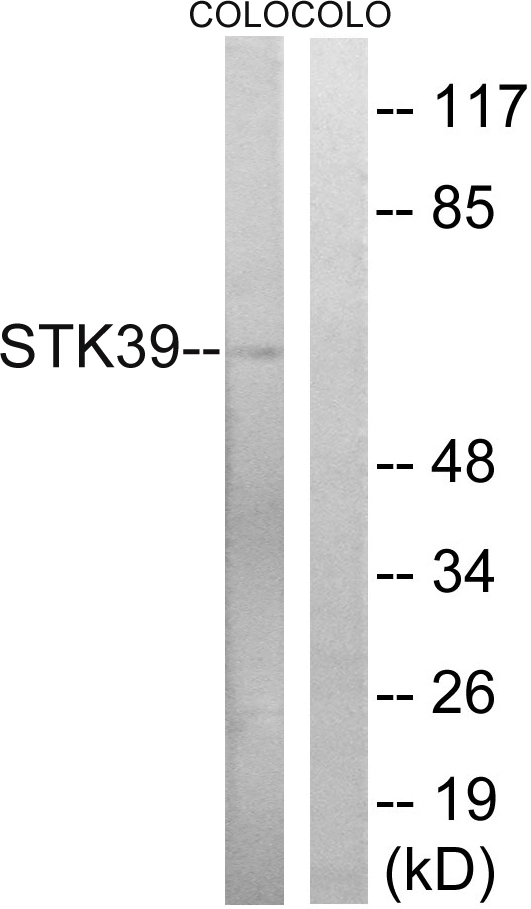
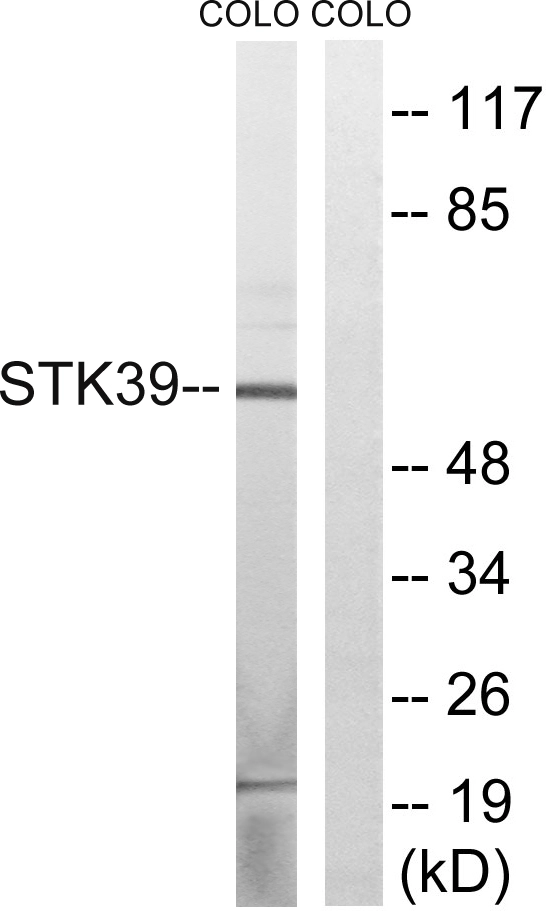
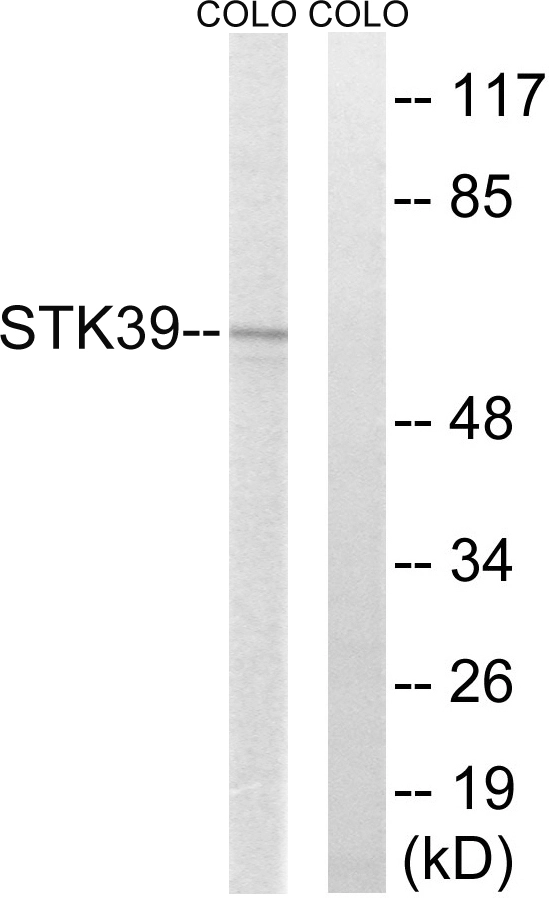


![IHC-P analysis of human colon adenocarcinoma tissue using GTX83541 STK39 antibody [3C12]. Antigen retrieval : Heat-induced epitope retrieval by 10mM citrate buffer, pH6.0, 100oC for 10min.](https://www.genetex.com/upload/website/prouct_img/normal/GTX83541/GTX83541_1526_IHC-P_w_23061420_261.webp)
![IHC-P analysis of human breast adenocarcinoma tissue using GTX83542 STK39 antibody [4E3]. Antigen retrieval : Heat-induced epitope retrieval by 10mM citrate buffer, pH6.0, 100oC for 10min.](https://www.genetex.com/upload/website/prouct_img/normal/GTX83542/GTX83542_1531_IHC-P_w_23061420_179.webp)
